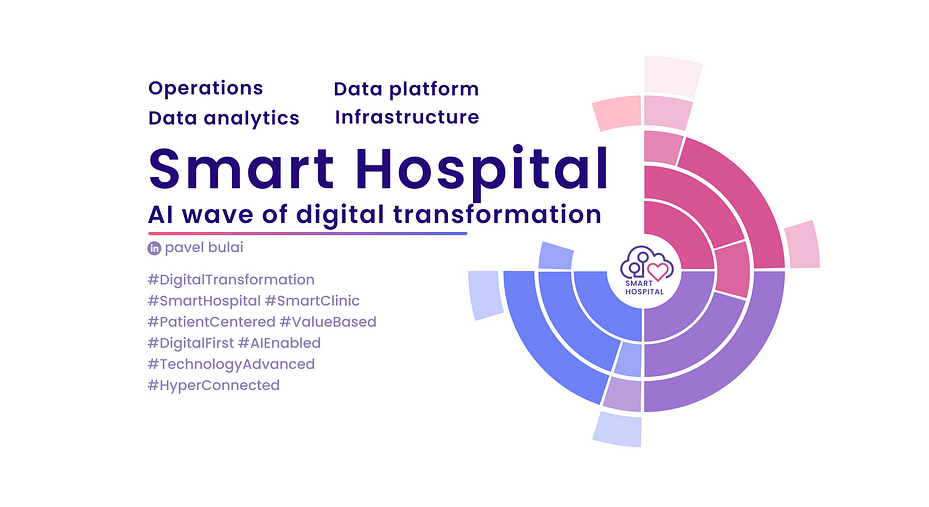What is the message?
Today’s healthcare providers face multiple challenges, including rapid technological advancements, changes in care delivery and financing models, and increasing demands for personalized and accessible care influenced by demographic shifts and the prevalence of behavioral and chronic conditions.
These challenges require strategic responses to ensure both the sustainability of clinical practices and the delivery of high-quality patient care.
The most logical step forward is to embrace digital and technological changes in their services, especially with the rise of AI.
However, this transformation involves implementing many separate digital solutions, making adjusting and connecting them difficult.
The market lacks a specialized vertical Enterprise Management Solution with PaaS/SaaS architecture that can seamlessly integrate all these services.
That’s where “Smart Hospital” is a suitable name for such a comprehensive transformation.

Adapted from “Smart Hospital. AI Wave of Digital Transformation”, written by Pavel Bulai in Apr 9, 2024
Executive summary
The transformation towards Smart Hospitals represents a fundamental shift in healthcare, integrating advanced technologies to revolutionize patient care and hospital operations.
This executive summary encapsulates key aspects of Smart Hospital operations, the data platform, data analytics, and infrastructure, highlighting their significance in reshaping healthcare delivery.
Key Points:
Operations and Management: Smart Hospitals integrate seamlessly with other components, translating technological advances into practical, efficient healthcare delivery. Adhering to clinical guidelines and leveraging AI tools ensures adherence to standards and facilitates efficient patient care processes.
Compliance and Regulations: Navigating privacy, data protection, and AI regulations is crucial. Smart Hospitals must comply with medical software and device regulations, aided by digital solutions ensuring adherence to standards while maintaining patient safety and data security.
Hospital Management: Efficient management encompasses Patient Management, Hospital Management, and Enterprise Resource Management systems. Effective Documents Flow Management ensures seamless handling of records, while a Customer Data Platform enhances data management and operational efficiency.
Communication: Leveraging conversational AI enhances patient support, crucial in remote monitoring and telehealth, breaking down language and accessibility barriers.
Data Platform: Serving as the backbone of digital health, the Data Platform includes Data Lake, Governance, Data Ingestion, and Value Services +AI, providing infrastructure for advanced data management and analysis.
Data Analytics: Descriptive, Predictive, and Prescriptive Analytics drive healthcare transformation, offering insights into hospital operations, diagnostics, predictive modeling, and personalized care.
Infrastructure: Servers, Network, Edge Computing, and Remote Care technologies form the backbone of Smart Hospital infrastructure, facilitating seamless data exchange and advanced healthcare delivery.
Key Statistics:
- Top players in Data Platform services include AWS, Azure, and GCP.
- Edge computing reduces latency and enhances decision-making efficiency.
- Remote Patient Monitoring and Telehealth technologies enhance healthcare accessibility and patient experience.
- McKinsey’s insights on digital rewiring offer valuable strategies for enterprise transformation.
Conclusion:
The journey towards Smart Hospitals requires a balance of technological innovation, regulatory compliance, and patient-centric care.
As healthcare continues to evolve, the central role of AI and digital technologies will drive enhanced efficiency, improved patient outcomes, and more personalized care.
The future of healthcare lies in leveraging these digital advancements to create responsive, efficient, and effective healthcare systems.
Wrapping Up
The Smart Hospital transformation marks a pivotal shift in healthcare, potentially laying the groundwork for Solutions with Platform/Software as a Service (P/SaaS) models.
This transition embodies the essence of digital transformation in healthcare, integrating AI and advanced technologies to revolutionize patient care and hospital operations.
The journey towards a Smart Hospital is both challenging and rewarding.
It requires a careful balance of technological innovation, adherence to regulations, and a focus on patient-centric care.
The future of healthcare lies in leveraging these digital advancements to create more responsive, efficient, and effective healthcare systems.
As this evolution continues, the role of AI and digital technologies will become increasingly central, offering new possibilities for healthcare delivery and management.

DEEP DIVE
Smart Hospital. AI Wave of Digital Transformation
Pavel Bulai
Apr 9, 2024
Let’s Dive In…
The advent of the Smart Hospital concept represents a significant leap in healthcare’s digital transformation journey. This evolution, propelled by the recent surge in artificial intelligence (AI), reshapes how healthcare providers operate and deliver services.
In 2023, the Smart Hospitals Market was valued at approximately USD 57.53 billion, and it’s projected to expand at a CAGR of 18.24%, potentially reaching USD 187.20 billion by 2030
Several factors drive this market:
- the shift towards patient-centered, value-based care;
- the accumulation of extensive data through clinical and care systems;
- the urgent need for efficiency, sustainability, and technological advancement in healthcare; and
- the global shortage of healthcare professionals.
Additionally, an escalating demand for enhanced healthcare services and technological advancements underscores a growing need for cost-effective medical solutions.
However, implementing Smart Hospital solutions is not without challenges. Key obstacles include stringent regulations concerning software, devices, AI, and data privacy, the high costs associated with implementation, and the requirement for specialized skills.
Considering the significant decline in investments in the digital health market and asset consolidation, it seems logical to anticipate the consolidation of various digital solutions into vertical Enterprise Management Solution (EMS), with PaaS/SaaS architecture, offerings.
This article briefly overviews the key architectural components integral to the Smart Hospital Solution, particularly emphasizing AI-enabled applications.
By exploring these elements, we seek to illustrate how AI is revolutionizing the healthcare sector, offering innovative solutions to longstanding challenges and paving the way for a more efficient, sustainable, and patient-centric healthcare system.
This article targets VPs in healthcare who are responsible for innovation and digital transformation. The content is designed to guide leaders in navigating the complexities of implementing AI-driven solutions in healthcare facilities, addressing market trends, challenges, and technological advancements.

Operations and Management: Enabling Care Excellence
Operations in a Smart Hospital are a crucial pillar, seamlessly integrating with other components. It plays a pivotal role in translating technological advances into practical, efficient healthcare delivery, ensuring that the digital transformation in healthcare is not just technologically advanced but also patient-centric and operationally efficient.
Protocols and records
Adhering to and enhancing clinical guidelines, procedures, and care pathways is the core of clinical excellence.
AI and digital tools could be critical in navigating these protocols, ensuring adherence to standards, and facilitating more efficient patient care processes.
Recent GenAI-LLM could mainly be applied for semantic search, case reasoning, ontology development, and expert agents.
Compliance and Regulations
Navigating the complex web of privacy, data protection, and AI regulations is essential.
Smart Hospitals must rigorously comply with medical software and device regulations, a process greatly aided by digital solutions that ensure adherence to these stringent standards while maintaining patient safety and data security.
Hospital Management
In the realm of Smart Hospitals, efficient management encompasses a comprehensive Patient Management System to streamline patient care, a robust Hospital Management System for operational excellence, and an advanced Enterprise Resource Management for optimizing resources and processes.
Additionally, effective Documents Flow Management ensures seamless handling of medical and administrative records.
Integrating these components with a Customer Data Platform further enhances data management and operational efficiency, laying a solid foundation for a digital-first healthcare environment.
Communication
Leveraging conversational AI (based on modern LLMs) enhances patient support and experience. This aspect is crucial in remote monitoring and telehealth, breaking down barriers in language and accessibility.
Each of these components is integral to the smooth operation of a Smart Hospital, reflecting the growing influence of AI and digital transformation in the healthcare sector.
The integration of these technologies not only streamlines operations but also significantly improves patient care and experience.

Data Platform: The Backbone of Digital Health
The Data Platform in Smart Hospitals is a critical component, functioning as a suite of services essential for the digital enterprise.
This platform is often API-centered and can be deployed in various environments: cloud, on-premise, or hybrid. Top players are AWS, Azure, and GCP, as well as many others that are small or specialized.
Data Lake
This includes file storage, databases, and backups. It serves as the central repository for all types of data, structured or unstructured, playing a vital role in the storage and retrieval of large volumes of healthcare data.
Governance
A robust governance framework encompassing security, compliance, access control, monitoring, and management is essential. This ensures that data is not only secure but also compliant with various health data regulations.
Data Ingestion
This involves data streaming, migration, transformation, and the establishment of a data catalog and ETL processes. These processes are crucial for maintaining data integrity and accessibility.
Value Services
These services include data warehousing, big data processing, real-time analytics, Business Intelligence (BI), dashboards, and integration with third-party services. They provide the backbone for data analysis and decision-making processes.
Value Services +AI
This includes ML/DL instances, generative AI hosting, and specialized AI functions like computer vision, speech recognition and generation, language translation, language comprehension, and chatbots. These advanced AI-driven services enhance the data platform’s analytical capabilities.
The Data Platform plays a significant role in Smart Hospitals, providing the infrastructure for advanced data management and analysis.
The choice between cloud-based services and on-premise solutions depends on various factors, including specific healthcare needs, regulatory requirements, and organizational priorities.
Cloud solutions often offer more flexibility and scalability, making them a popular choice in the modern healthcare environment.

Data Analytics: Turning Data into Decisions
Data Analytics in Smart Hospitals is a pivotal component, driving the transformation of healthcare delivery through AI-enabled insights.
Descriptive Analytics
This layer involves mining and statistical analysis, reporting, and visualization. It provides a comprehensive view of hospital operations and patient data. The use of synthetic data and digital twins helps in simulating various scenarios and planning.
Health Diagnostics
Here, data analytics plays a crucial role in biomedical imaging, big data in bioinformatics, and AI-assisted diagnosis.
Clinical decision support systems, backed by data analytics, are instrumental in enhancing diagnostic accuracy and patient care.
Predictive Analytics
This aspect is about forecasting outcomes and readmissions, anticipating outbreaks and risks, managing chronic diseases, and predicting demand for healthcare services.
Predictive models help in proactive healthcare management, improving patient outcomes, and optimizing resource utilization.
Prescriptive & Preventive Care
Analytics contribute significantly to personalizing care, mitigating risks and errors, and enhancing population health management.
It includes preventive care strategies, the discovery of new therapies, resource planning, and optimization.
Clinical research and trials are also data-driven, ensuring better and faster outcomes.
The challenges and perspectives of AI-enabled analytics in Smart Hospitals are vast.
These analytics offer groundbreaking potential in improving healthcare delivery, patient outcomes, and operational efficiency.
However, they also present challenges like data privacy, the need for skilled personnel, and the integration of AI into existing healthcare systems.

Infrastructure: Building the Future-Ready Healthcare
Infrastructure in Smart Hospitals is the backbone that supports all technological and digital functions. It’s essential for the seamless operation of various healthcare services and patient care technologies.
Servers
At the core infrastructure are servers that play a pivotal role in hosting data and services, along with serving as gateways to the cloud, ensuring that healthcare providers can securely access and manage patient information and hospital operations from anywhere.
Network
The network infrastructure, encompassing both wired and wireless systems, is vital for the seamless data exchange.
It supports Internet of Medical Things (IoMT) protocols, which enable a multitude of medical devices to connect and communicate, facilitating real-time data transport across hospital systems.
Edge computing
Edge computing introduces a paradigm shift by bringing computational power closer to the source of data.
This approach integrates embedded AI within medical devices, leveraging edge computing to process data on-site, which significantly reduces latency and enhances the efficiency of decision-making processes.
As a key approach to distributed AI, Federated learning allows for developing AI models that learn from diverse datasets across different locations while maintaining data privacy and security, embodying autonomy and sustainability in hospital operations.
Remote Care
Remote Patient Monitoring (RPM), Remote Therapeutic Monitoring (RTM), connected medical devices, TeleHealth, and mHealth are pivotal to modern healthcare.
These innovations enable continuous care for patients within and beyond hospital boundaries, enhancing healthcare accessibility.
They play a critical role in supporting individuals needing chronic care, post-discharge follow-ups, or elderly care, thereby transforming patient experience and outcomes.
The infrastructure of Smart Hospitals is not just about hardware and software; it’s about creating a cohesive and integrated system that supports advanced healthcare delivery.
This infrastructure is continuously evolving, adapting to new technologies and patient care needs.

Wrapping Up
The Smart Hospital transformation marks a pivotal shift in healthcare, potentially laying the groundwork for Solutions with Platform/Software as a Service (P/SaaS) models.
This transition embodies the essence of digital transformation in healthcare, integrating AI and advanced technologies to revolutionize patient care and hospital operations.
The architecture we’ve explored — from operations to infrastructure — highlights the potential for enhanced efficiency, improved patient outcomes, and more personalized care.
For those seeking business guidance on executing enterprise transformation, resources like McKinsey’s insights on digital rewiring provide valuable strategies. These resources can offer a detailed roadmap for healthcare leaders looking to navigate the complexities of digital transformation in their organizations.
The journey towards a Smart Hospital is both challenging and rewarding.
It requires a careful balance of technological innovation, adherence to regulations, and a focus on patient-centric care.
The future of healthcare lies in leveraging these digital advancements to create more responsive, efficient, and effective healthcare systems.
As this evolution continues, the role of AI and digital technologies will become increasingly central, offering new possibilities for healthcare delivery and management.
Originally published at https://medium.com on April 9, 2024.












